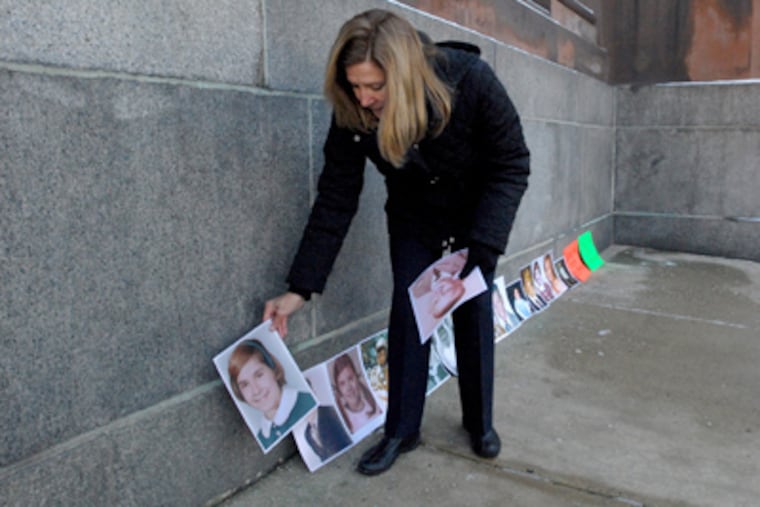Monica Yant Kinney: Lawmakers act to broaden prosecution of child sex abusers
HARRISBURG - In 2005, State Rep. Mike McGeehan couldn't finish reading the grand-jury report on child sex abuse in the Archdiocese of Philadelphia.

HARRISBURG - In 2005, State Rep. Mike McGeehan couldn't finish reading the grand-jury report on child sex abuse in the Archdiocese of Philadelphia.
"I was sick to my stomach" over the graphic tales of torture and terror, the Catholic legislator explained, "moved, but not motivated enough to introduce legislation."
On Tuesday, emboldened by a second grand jury report last month excoriating the archdiocese for protecting rapists over minors, the Northeast Philadelphia Democrat redeemed himself. Standing in the Capitol Rotunda with the world as his witness, McGeehan introduced a bill giving sex-abuse victims from any era a two-year window to file civil lawsuits against those who stole their innocence.
"I don't come to this advocacy naturally," McGeehan admitted, saying he'd been inspired by a 65-year-old constituent only now processing the pain. "It took him 50 long years to find the courage to speak up," but once he did, the man had no recourse.
"These false timelines we've established need to be stripped out," McGeehan told me. "People come to terms with abuse in their own time, for their own reasons. We need to give them an opportunity to heal. And there needs to be consequences for these perpetrators."
A race against time
Under Pennsylvania law, children abused today have until their 50th birthday to press criminal charges and their 30th to file a civil lawsuit. But adults are subject to the law at the time of their attack.
So a 15-year-old raped in 1993 had only until 2001 to bring a civil lawsuit, five years after he turned 18. And because the criminal statute of limitations was not extended to age 30 until 2002, that boy's perpetrator cannot be prosecuted.
"Most 48-year-old victims can't bring criminal cases. And many 30-year-olds can't," explained Assistant District Attorney Mariana Sorensen. "That's what's confusing. People think we fixed the law, but most people from the past have not benefited from the changes."
To end the confusion, Philadelphia Democratic Rep. Louise Williams Bishop introduced a companion bill to eliminate statutes of limitation - civil and criminal - in future child sex-abuse cases.
Both grand juries, it should be noted, called for the same legislative measures. Even regular citizens know that as written, the laws remain stacked in favor of evildoers and enablers.
Reality check
Catholics remain incensed and betrayed by the latest revelations, but pique alone won't get the child sex-abuse bills passed.
McGeehan and Bishop seem committed to the cause, but neither holds much sway in the GOP-controlled House. And they're no match for the Pennsylvania Catholic Conference, which since 2007 has spent nearly $2 million on lobbying.
In 2008, Rep. Thomas Caltagirone - a Berks County Democrat who was chairman of the powerful Judiciary Committee - gleefully killed an effort similar to McGeehan's. He accused proponents of being driven by money, not justice. Caltagirone even refused to let victims speak publicly, claiming hearings would be a "dog and pony show" creating "false hopes."
The 2008 bill's sponsor was Rep. Lisa Bennington, a young Democratic reformer from Pittsburgh. She remains "heartbroken" and blames the archdiocese for flaunting its money and muscle.
"The Pennsylvania Catholic Conference became a vicious lobby against this bill that would have protected children from predators," Bennington told me. "That experience, and trying to get emergency contraception passed for rape victims, showed me that the Catholic Conference is a fierce, malicious lobby and that there is no separation of church and state."
I asked the archdiocese early Monday for a comment on the new legislation. But by Tuesday evening, all spokeswoman Donna Farrell would say was, "The archdiocese is reviewing the proposed legislation."
Dismayed and disgusted by government inaction, Bennington quit the legislature after one term and returned to practicing divorce law.
We both hope the latest grand jury report weighs heavily on the minds of legislators who previously ignored victims' cries. But when I asked Bennington whether the new bills would become law, she was as blunt as the sex crimes are brutal:
"No."